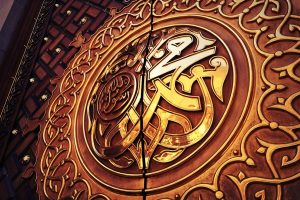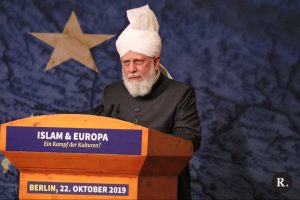
Abdul Rafiq Lartey, Ghana
Eid al-Adha is the second of the two Islamic holidays celebrated worldwide each year. It is also known as the festival of sacrifice. Some people also call it the greater Eid. For such a day to hold such value, there must be a purpose for celebrating it. The subject of Eid al-Adha cannot be discussed without first understanding the background story.
Eid al-Adha is not a festival that originated from man. It has a divine origin. Muslims all around the globe join in on Eid al-Adha celebrations in commemoration of the great sacrifice that the Prophet Abraham (as) made as a result of his complete submission to the will of God. Abraham’s (as) faith was tested by Allah when he was commanded to sacrifice his only son at the time, Ishmael (as).
Given the fact that Ishmael (as) was a child bestowed upon Abraham (as) at a very old age, one can only imagine the emotions behind such a sacrifice. However, due to the love and complete trust that Abraham (as) had in Allah the Almighty, he obeyed the commandment although Allah later made it clear that Ishmael (as) was not to be physically sacrificed. Due to the love and fear of God Abraham (as) had in him, he was able to develop such a spirit of sacrifice so exceptional that Allah commanded all Muslims to set aside a special day for the commemoration of this sacrifice.
Although Eid al-Adha is celebrated worldwide each year, there are slight differences in the manner of its celebration from place to place, whereas the religious rites remain universally the same. However, many countries and groups of people have their unique ways of celebrating this festival.
Ghana is a country located in West Africa. The Atlantic Ocean sweeps its southern shores and it shares borders with Togo, Cote d’Ivoire, and Burkina Faso. Ghana, like most African countries, has a very rich cultural background that emphasizes values such as family, respect for the elderly, and the importance of dignity and proper social conduct. Islam in Ghana is believed to date as far back as the tenth century.
Today, Muslims form a large part of the Ghanaian population and play an active role in the major affairs of the country. The current Vice-President, Dr. Mahamadu Bawumia, is also a Muslim.
Eid al-Adha is equally a special festival for Muslims in Ghana. In fact, it is anticipated by both Muslims and Christians alike. This is very unique because usually some of our Christian brethren also eat and enjoy the celebrations with us. Many Christians also dress up like Muslims on such days and utter the expression ‘Barka da Sallah’ which is an expression in Hausa meaning ‘Blessed Eid prayers’. This can be observed on both Eid al-Fitr and Eid al-Adha. It is even more interesting to note that some Christians even know that Eid al-Adha is the greater Eid and those who do not know ask in Akan, ‘3y3 salah k3si3 nu anaa?’ meaning ‘Is it the greater Eid?’
A very important ritual carried on during the Eid celebrations is the sacrifice of an animal like a goat, sheep, or cow. Muslims do this in line with the physical sacrifice of a ram made by Abraham (as) in place of his son.
In Ghana, it is usually observed that the markets are busy due to the purchasing of sacrificial animals by Muslims a few days prior to the Eid al-Adha festival. The goats, sheep, and cows are sold in different sizes and colours and at different prices. The sheep with purely white wool are the most expensive and are believed to be the best for sacrifice.
Eid al-Adha is celebrated with so much zeal in Ghana. Muslims all over the country comprising of men, women, and children all dress in their best clothes, and the streets are filled with countless Muslims walking to their prayer grounds.
The mornings of Eid al-Adha and Eid al-Fitr are always special. While some walk to their respective Eid grounds, others drive in their cars with their families, and in some places, people are seen on motorcycles going for the Eid prayers.
Ghanaians, just like Muslims all around the world, also participate in attending the Eid prayers, listening to the sermon, sacrificing an animal, making donations to the poor, and coming together to eat. In some parts of Accra like Nima, huge gatherings are held where people can come and eat. Big cows are slaughtered to feed the masses and many charitable deeds are done. The Eid al-Adha celebrations usually cover a period of three days.
Ahmadi Muslims also make it a point to listen to the live Eid sermon of their spiritual leader, the Fifth Caliph and Worldwide Head of the Ahmadiyya Muslim Community, His Holiness, Hazrat Mirza Masroor Ahmad (aba). They are constantly reminded of the true spirit behind sacrifice as taught and explained by the Promised Messiah (as) and are encouraged to adopt that spirit of sacrifice and sincerity to Allah and in service to the country.
The true purpose of the celebration of Eid al-Adha is for Muslims to realise the importance of sacrifice, sincerity, and loyalty. Most people only see the food and celebrations aspect and neglect the true purpose of Eid. The spiritual leader of the Ahmadiyya Muslim Community has admonished his community time and over that, the blood of all those sacrificial animals should not be wasted, but they should be slaughtered for the purpose of the attainment of Taqwa (righteousness).
May Allah enable the world to realise the true purpose of Eid al-Adha and the importance of values such as sacrifice, love, and loyalty in the solution to the crisis we find ourselves in both at the national and global levels. Ameen.
About the Author: Abdul Rafiq Lartey is a fourth-year student at the International Ahmadiyya University of Theology and Scholastic Sciences in Ghana




Add Comment